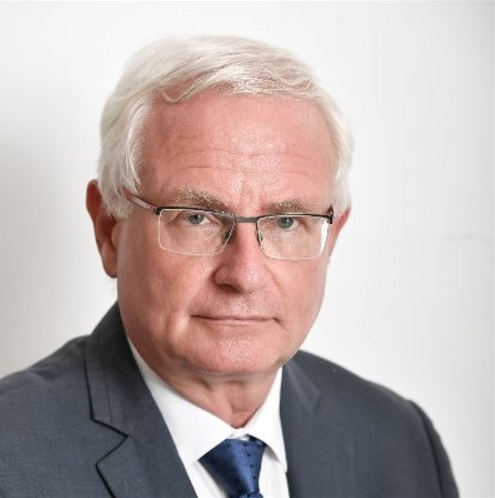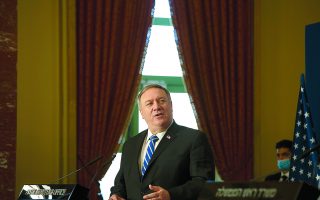Greece can count on Israel’s support

Colonel (ret.) Dr. Eran Lerman served as an intelligence officer, deputy director for foreign policy and international affairs at Israel’s National Security Council and personal advisor to former prime minister Benjamin Netanyahu (2009-2015). He continued his career as an academic at Tel Aviv University, at the International Program on Security and Diplomacy (MA Security and Diplomacy), and as vice president of the Jerusalem Institute for Strategy and Security.
As a security advisor, he helped re-establish diplomatic relations between Greece and Israel, and promoted multi-level cooperation between the two states, focusing on the EastMed energy agreement.
– Professor, how did your role as deputy security advisor and intelligence officer influence the revival of Greece-Israel relations?
At age 18, I formed a very strong opinion about this issue, and I can say that I was in the position to push this effort towards implementation in the years in which I worked closely with prime minister (Netanyahu) and as national security advisor. And I had a role to play in Israel’s positive response to the plight of Greece after the economic crisis and then in the initial creation of the relationship between the two nations. The people know that I worked hard out of government and then in government to reorient Israeli policy in the direction of Mediterranean identity and a Mediterranean alignment. I’m very glad to see in practice things that I wrote about and dreamed about, I would say 15 years ago.
– What is the strategic significance of the enhanced Greece-Israel relationship?
What has happened in the last few years, including the tripartite summits, the strategic cooperation, the military relationship, the joint military exercises, the economic plans, the energy integration strategies, all of these leaders basically redefined where we are, where we live. The term “Middle East” is increasingly a British colonial relic and I would say that we live in a Mediterranean world in which our relationship is increasingly important. Of course, it brings Egypt in as part of a parallel tripartite process and this generates a strategic alignment of forces that is the core of the capacity to sustain stability in the Eastern Mediterranean and beyond it. However, it is increasingly anchored in a relationship with France to the West and the relationship with the United Arab Emirates, with its remarkable resources and dynamism to the East. And of course, it is rooted in a perception of threats that includes not necessarily Turkey as a nation, but certain interpretations of Turkish interests and certain interpretations of Turkish history and ambitions, as we saw in the last few years under [President Recep Tayyip] Erdogan. There may be some positive indications of change in this respect, but they come because of our strength together and not as a substitute for it. And I think this is the message of the Israeli government, including the actions of President [Isaac] Herzog to visit Athens first, and then Cyprus, and to be doing this before he goes to Turkey.
– Concerning the Ukrainian crisis, how crucial is the EastMed pipeline’s construction for Europe’s gas independence? Many claim that it is back on the table.
It could be because the Germans have now scrapped Nord Stream 2. Almost overnight, the Germans have gone through a revolution in their strategic orientation towards Russia. It’s a very, very dramatic event of the first magnitude. I’m glad the German people have learned to hate war. The alternative is familiar to you and to us from history, but all of a sudden, they realize that they cannot afford to convey weakness. So with the Nord Stream 2 scrapped and with relations with Russia likely to be disrupted for a very long period to come, it may raise the [EastMed] pipeline’s economic viability once again. But as I said, I do not see a huge difference in terms of Europe reducing European dependence on gas. Whether you provide a sufficient amount of electricity from gas and the production will be in the Eastern Mediterranean, or you push the gas itself to Italian shores and they make it into energy there – because this is largely about power stations – it’s about electricity at the end of the day, and the two ways provide solutions.
– Based on current developments, can we predict the revival of the EastMed gas supply line?
It’s not impossible. It’s very much a question of calculating costs against projected income at the end of the day. This is an economic project. It’s not simply a strategic instrument. But as I said, I would also think the power cable, the interconnector proposition, is also good for us – I mean Israel, Cyprus, Greece and Egypt – and it is a viable alternative. In the end, I think it should be left to the professionals, the economists, the energy experts, as well as the generals and the strategists to put their heads together and see what our common interest is in the best way. But I certainly would warn against over-interpretation or negative interpretation of the change in the American position. And I would keep an open mind given what has just happened as to what would be the best economic solution to the energy shortfall.
– In a hypothetical scenario of Turkey’s escalation in the Aegean or Eastern Mediterranean, or even an invasion of Greece or Cyprus, what would Israel’s response likely be?
Well, I think it’s very clear that we are not going to be, I believe, in a position to lend direct military support. We are strained as we are on our borders by the Iranian enemy and proxies that we have. However, there are three things where we can make a very real difference. One is intelligence sharing, which I think has been growing very dramatically in recent years. The second is the supply of weapons systems, sophisticated weapons systems, and defense against missiles, defense against drones. The Turks are very prolific in the field of drones, but there are answers to this challenge. And the third would be to work very aggressively together in the American arena to make sure that, first of all, NATO obligations are implemented and then a country that ceases to behave as a NATO ally will no longer be a NATO ally. Although we all know there is no provision for this in the NATO statutes, there are ways of doing things and support, military support and political support and, of course, what we are seeing now is a kind of very impressive array being utilized. I think you can count on very firm support from Israel and Israel’s friends. I mean, at the end of the day, I dare see signs of sobering up in Ankara – and the Ukrainian situation is probably conducive to that – and NATO, all of a sudden, looming very large for Turkey as a significant part of their security posture. And so, there may be a limit to what they are now willing to do that actually undermines NATO.
– Is Russian President Vladimir Putin’s strategy a mistake or is it just the beginning of other major future events like with China or Serbia?
Well, I’m risking my reputation. I think he could live to regret his choice of action. This is not Abkhazia or Ossetia. The internet reaction is remarkable. Much as Israel would have preferred to stay neutral on this one because of our sensitive concerns in Syria, where Russia is effectively our military neighbor, Israel will support a United Nations peace resolution [Note: Israel voted to condemn Russian aggression against Ukraine at the UN on March 2]. And that’s just one example of just how powerful the soft power of Ukraine proved to be under the circumstances. Beyond that, military power is definitely a very important element in all strategic equations, and nobody should underestimate the importance of military power to entertain global ambitions on the basis of an economy smaller than that of Spain, I think, or equivalent to that of Spain or South Korea, which is the case for Russia, an economy which has essentially no industrial exports at all. I mean, one Russian said that, in addition to, of course, oil and gas, which Russia sells, it also sells is caviar, fur and blueberries, all products of a hunter-gatherer society. It is a country with serious economic limitations. And I think it may learn that there is a limit to how far you can push your ambitions on that basis.
– What is your prediction about the future global arena? Are we waiting for other major changes or not?
Well, in the Jewish tradition, they say that the prophecy has been taken away and given to fools and madmen, and I hope I’m not categorized as either. I am not a prophet. I could say that if Russia is deeply weakened, it will make it more and more of a Chinese dependency. The real economic and strategic power would shift to Beijing and this would probably make our world more dangerous because it would be more divided between two blocks, two massive blocks – the dollar block, and the renminbi block. If you wish to speak in economic terms, a democratic block, and an autocratic block, if you want to speak in ideological terms, you can also throw in the Confucian and Christian, but I doubt if that’s useful.
My respect for Samuel Huntington notwithstanding, I think it’s not a variant of the clash of civilizations. It’s a question of politics. It’s a question of power. It’s a question of economic structure. But the world will become more divided, with Russia, a very important strategic player, becoming a Chinese agent. Whether this will tempt the Chinese, as [US] admiral [James] Stavridis has predicted, into a posture that would lead to war in the next decade, all I can say is, I hope not. There is a famous book by a great Harvard scholar. It’s called “Destined for War” and uses a Greek connotation, the Thucydides track, the observation of evidence that the war and the Peloponnesian War were made inevitable because the Spartans feared the rise of Athens.
Today, the Americans, the West, fear the rise of China, and this had happened before when Britain feared the rise of Germany in the early years of the 20th century. I hope we are not looking at a scenario that would lead us to another global war. There are ways of preventing it, but this would require a very sober and hard-working leadership in Beijing, Washington and Europe.





